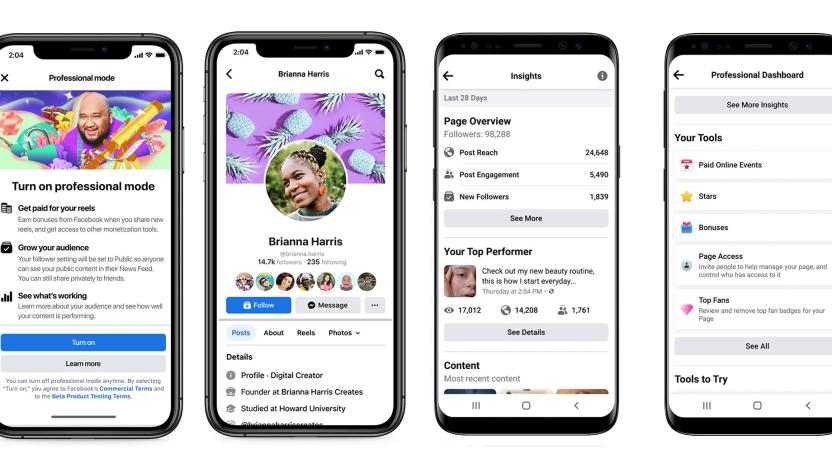monetize
Latest

Facebook's 'Professional Mode' lets creators monetize their own profile page
Facebook has launched a new professional mode for profiles that will let eligible creators earn money without the need to create a separate Page.

YouTube will allow some creators to monetize coronavirus videos
YouTube says it's reassessing its coronavirus policies and will enable ads on a limited number of channels that discuss the outbreak. Initially, YouTube demonetized all videos that mentioned coronavirus. But after facing backlash, and realizing that this will be an ongoing topic for many creators, YouTube is changing its stance.

LGBTQ+ creators file lawsuit charging YouTube with discrimination
In a federal lawsuit filed yesterday, a group of LGBTQ+ video creators claims YouTube discriminates against their content. The group alleges that YouTube suppresses their videos, restricts their ability to monetize their channels and enforces its policies unevenly, giving more leeway to producers with large audiences. According to The Washington Post, the suit argues that YouTube deploys "unlawful content regulation, distribution, and monetization practices that stigmatize, restrict, block, demonetize, and financially harm the LGBT Plaintiffs and the greater LGBT Community."

Get ready for ads in Facebook Stories
While Facebook's version of Stories have taken a while to gain traction, the format isn't going anywhere soon. Apparently, Facebook has enough users (some 150 million daily active users) now to start testing ads within Stories, according to TechCrunch.

'Casual content' might account for only a small part of gaming industry's revenue
Monetisation of online games has been a hot topic for the past few years, fueled by the rise of the free-to-play business model and the undeniable accessibility of mobile gaming. At the Digital Game Monetization Summit in San Francisco, developers shared insights into the source of their revenue and recent development trends in social gaming. Rumble Entertainment CEO Greg Richardson argued that only 10% of the $50 billion spent on games last year was spent on "casual content" like social and mobile games. He believes that the tricks early Facebook and mobile games used to spread themselves virally may no longer work and that as a result, the future profit lies with people who self-identify as gamers. Online gaming website Kongregate revealed a detailed breakdown of monetisation and performance stats from its games, noting that its top games get the majority of their revenue came from people who spend $500 or more. Commitment was noted as the key to having successful game, with 84% of revenue coming from dedicated fans who played a game 50 times or more. [Thanks to Segun Adewumi for the tip!]

Samsung's Smart TV SDK reaches 3.0 with support for USB controllers, payment and ads
Even though all signs indicate Samsung will be joining the Google TV party shortly, it's not going to give up on its own existing Smart TV platform just yet. We don't know if it will run the two side by side as it has operated with Yahoo! Widgets, but the Korean manufacturer has announced it plans to release version 3.0 of its SDK January 5th. The new Samsung Apps toolkit supports mobile devices and TV sets, and lets developers build in support for remote controls, as well as USB mice, keyboards or gamepads. Of course, not all devs will work for free, so they're also adding a way for them to get paid through the built-in payment system or advertisements. Currently, Samsung claims 25,000 developers from 140 countries in its forums, but we'll have to wait until CES 2012 to find out if its products live up to the hype and attract more innovative software to the segment.

EVE Evolved: Third-party development
When EVE Online was first released in 2003, it was a primitive beast from a small indie studio operating out of a tiny office in Reykjavik, Iceland. Although EVE has been expanded over the years, not all of that development has come from creator CCP Games. EVE players routinely step in to fill gaps in the game's functionality through the development of third-party applications, websites and tools. Early apps like the EVEMon skill planner were very limited in what information they could access about a player's character, but with the introduction of the EVE API system, a huge wealth of information became available. Since then, we've seen a resurgence of third-party app and tool development, producing impressive apps like Capsuleer and Aura for the iPhone. We've also seen some incredibly useful websites like the ICSC jump planner suite, gambling site SOMER.blink and the Dotlan EVE maps with regularly updating statistics. Most app developers work on the projects in their spare time, and until now they've relied on donations or advertising revenue to keep up with server costs or keep development worth the time invested. As EVE is CCP's intellectual property, it's illegal for anyone to make money from it without the company's permission. This week, CCP released the first draft of a contract that would allow developers to monetise their apps, but the proposal was not received well by the EVE community. In this week's EVE Evolved, I look at third-party app development and what's wrong with the proposed deal.




